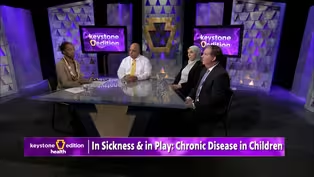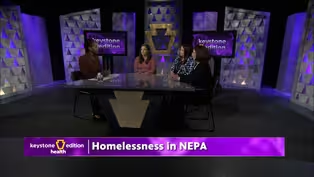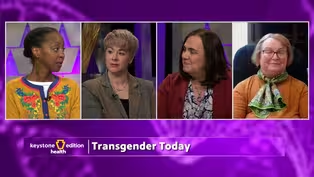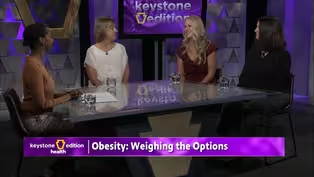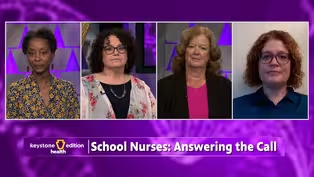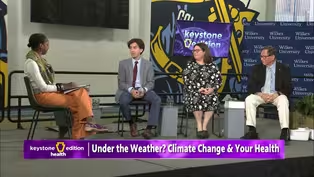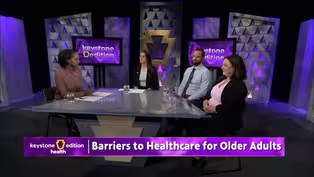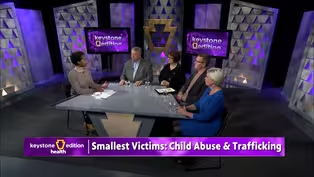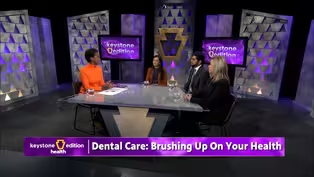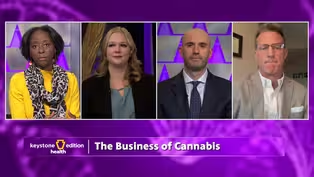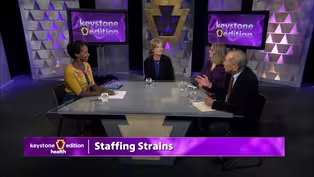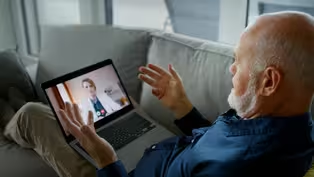Keystone Edition
Primary Care: The First Line of Defense
2/27/2023 | 27mVideo has Closed Captions
When was the last time you saw your primary care doctor?
When was the last time you saw your primary care doctor? Reliable access to a primary care physician is a key component of overall health. The role of a family or primary doctor has evolved and in some cases, become even more integral in leading a healthy life, even as some barriers to access persist.
Problems playing video? | Closed Captioning Feedback
Problems playing video? | Closed Captioning Feedback
Keystone Edition is a local public television program presented by WVIA
Keystone Edition
Primary Care: The First Line of Defense
2/27/2023 | 27mVideo has Closed Captions
When was the last time you saw your primary care doctor? Reliable access to a primary care physician is a key component of overall health. The role of a family or primary doctor has evolved and in some cases, become even more integral in leading a healthy life, even as some barriers to access persist.
Problems playing video? | Closed Captioning Feedback
How to Watch Keystone Edition
Keystone Edition is available to stream on pbs.org and the free PBS App, available on iPhone, Apple TV, Android TV, Android smartphones, Amazon Fire TV, Amazon Fire Tablet, Roku, Samsung Smart TV, and Vizio.
Providing Support for PBS.org
Learn Moreabout PBS online sponsorshipMore from This Collection
Healthcare is constantly changing as technology finds new and better ways to help people live longer, healthier lives. Host Tonyehn Verkitus will address the issues that are important to the people in our community, including the ongoing pandemic, concerns about vaccines, food deserts, childhood trauma and child abuse, mental health, environmental issues, and the rising cost of staying healthy wit
Domestic Violence: Breaking the Silence
Video has Closed Captions
Access to the right resources can make facing this challenge a little easier for families (26m 59s)
In Sickness and in Play: Chronic Disease in Children
Video has Closed Captions
About 25% of children in the US aged 2 to 8 years have a chronic health condition (27m)
Video has Closed Captions
Homelessness can happen to anyone at any age or socio-economic status. (26m 59s)
Video has Closed Captions
As we raise the visibility on Transgender young adults and embrace them within our culture (26m 59s)
Video has Closed Captions
Obesity is a serious risk factor many try to avoid when developing healthy eating habits. (27m)
School Nurses: Answering the Call
Video has Closed Captions
What can our school districts do to help retain and recruit nurses for future generations? (27m)
Under the Weather? Climate Change & Your Health
Video has Closed Captions
How does climate change impact individual and public health? (54m 59s)
Barriers to Healthcare of Older Adults
Video has Closed Captions
What progress have local organizations made in addressing these challenges? (27m)
The Smallest Victims: Child Abuse & Trafficking
Video has Closed Captions
What are the signs to know to spot child abuse and even possible trafficking? (27m)
Dental Care: Brushing Up on Your Health
Video has Closed Captions
How can providers make dental care more affordable and accessible? (26m 59s)
Video has Closed Captions
What does the cannabis industry mean for Northeastern and Central Pennsylvania? (26m 59s)
Video has Closed Captions
Low staffing levels can lead to burnout among healthcare workers (27m)
Providing Support for PBS.org
Learn Moreabout PBS online sponsorshipLive from your public media studios wdia presents Keystone addition health a public affairs program that goes beyond the headlines to address issues in and Central Pennsylvania This is Keystone addition health and now moderator tanya Vertitus Good evening and welcome to Keystone addition health anti-gay Vertitus Thank you for joining us tonight Tonight we'll hear from our panel of experts about the importance of regular access to primary care but first wpi is sarah santo has more reliable access to a primary care physician is a key component of overall health wellness visits help people stay on top of their health and give physicians a chance to spot potential issues early in 2019 the cdc reported 50 percent of the one billion doctor's visits americans made for tv to a primary care doctor but those in person visits declined dramatically during the course of the pandemic expanded telehealth offerings got patients back in touch with their primary doctors and now that in-person visits are allowed once more Many practices are recovering financially and able to continue providing the personal care that has become even more vital in recent years for Keystone Edition health I'm sarah santo joining us tonight We have teresa lacey See Oh wait memorial community health centers was e-commerce medical director at scranton primary health care center and kristen followed ceo of an epa community health care Thank you all for joining joining us Thank you So I would love if someone would just start by defining primary care Maybe I'll pass this to you because I think sometimes people think of primary care is being your family doctor but really there's other specialties that might be included in primary care Yes they're can be so primary care is really your first line of care when you're seeking medical advice whether that be from a family physician a pediatrician a mental health practitioner or even your dental care and so primary care nowadays all of those specialties and why would you say primary care is important primary care providers really are Your first line of defense and there are the individuals that help connect you to additional specialties that you may need in order to provide comprehensive care as kristen had mentioned you know primary care is if you go to a provider offer a problem or condition and then you establish a relationship with them o you continue to go back and that relationship is really very important especially like in o'bagy why in the earlier you go for care when you become pregnant The better the outcomes are for the mom and the baby so it's really about establishing that relationship so that your provider can really connect you with additional resources that you may need that you're really not aware of and was a Why would you say that it's important to have a primary care provider that coordinates care because some people might think that they can deal with all their different specialty physicians themselves and keep track of their medications etc so obviously specialties play a major role when you have a problem they can come in and they can take care of things but there are so many things that overlap so if you're taking care of one problems disease but they also have diabetes They also have high blood pressure If they don't have all that set up Someone has to coordinate all that care to make sure that all in one place and you know almost like a quarterback who is making sure that you are coordinating you are reaching out to one person because sometimes they work in silos so they may not have all the information you know if you're in a big system you maybe coordinating but health care and electronic health records are not perfect yet so there are so many things going on in the background that if you're really not taking care of really truly paying attention to it You can miss vital information and that's fair that one person who knows you And there needs to be someone that patients feel comfortable and say you know I went to see the specialist This is what they said Do you think I need That's because they may not be comfortable talking to that specialist about things that are very personal to them but they have that report relationship with that one person that they've been saying for a long time now scranton primary you're more of an urban facility How many patients Would you guess you're seeing annually So we're still trying to crunch the numbers from last year and covered slowed things down but until recently when we had the statistics we had about 16000 patience for about forty nine thousand ordered visits Now they could be in pediatrics internal medicine family medicine dentistry women's health behavioral health so if you put all of them together This is the number of people number of visits that are coming into our doors and a lot of them them are not able to afford any place else and I think that's the bottom line for all the community health centers that we are present that people don't realize that these facilities are available that they can go to and for both of you your and more rural area so you might be the only people pack your population sees might want to speak to that a little bit too Yeah So in wayne We actually have 18 locations across across four counties and we are buried were considered rural and but unlike scranton primary You know where there's a lot of other providers that people have a choice to go to in wayne county we provide care for probably ninety five percent of the residents therefore our clinics really look very much like a typical clinic where we have uninsured and underinsured which fha these have been created to serve and to make sure that we meet their needs But we also have a large percentage of medicare patients and commercial payers can you explain for people who may not know what an epic uhc is and have huge see is a federally qualified health center This means that the health center is supplemented with funding from the federal government and we are tasked with the Care to provide health care to patients who are uninsured or underinsured so maybe they can't afford health care At the same level as as someone who has a higher income and so we are providing provided the additional funding from the federal government to pour that into our programming and provide sliding fees scale reduced co-pays and so forth For those patients so that they can come in and be seen without any financial barriers to their care so as Q hsc especially in rural communities we seem to be having an issue finding enough physician coverage in scranton which is a booming metropolis if you get out to the counties even less so So what are you doing to help fill that gap so in Pennsylvania advanced practice providers can function independently under the supervision of a physician but the position does not have to be on site all the time they do have to provide chart reviews review care so have periodic review reviews of the nurse practitioners in the physician assistants so we have supplemented much of ah care with those advanced practice providers with the oversight of the physician but we're continuously looking to recruit family medicine doctors pediatricians Do you have any incentives for these physicians we do we actually federally qualified health centers have a loan forgiveness programs so we have the ability to forgive loans up to a a certain amount for any of the health care providers that come out and work in our facilities and you have students that are coming through scranton primary as residents Do you find that any symptoms day in the area so So this is the long term plan that I think a lot of people are thinking about so primary in general We have a shortage and that shortage is going to grow so one of the estimates by association of american medical colleges says it's going to be between twenty two thousand fifty thousand over the next 10 years Pennsylvania has projected about eleven hundred primary care physicians that we will be short whether by 2030 so if you're not going to act now So what's happening is that population is getting older Which means people have more problems they have chronic problems that need to be taken care of and as people get older they want to have that physician or a provider who they can talk to and really trust and at the same time a lot of primary care physicians in the community are now retiring It's a lot of people are going to word specialties the incentives are different So that's where some thinking process that has been going on across this area especially so when the medical college was established in scranton the whole idea was that we can bring people in train them and keep them here so now they have their abigail scholars program with guys anger that ensures that people who choose to go They get they get scholarships through their medical education and they can come back and then they have a commitment to stay with the community so hopefully starting this year we have the first batch of people who'll be going into their residences and coming in and hopefully they'll be staying and filling some of these positions We have so so the residency program kicks into that is and one of the program that I direct was based on the same that if we focus on primary care We don't you know obviously we're going to teach them all aspects of medicine but at the same time at least expose them to these clinics or they come to scrap primary health care center They go to some other let them develop those relationships with the people the community is the population in the area and hopefully they will see the incentive that if they continue to stay they'll be able to continue to serve the population that they've been working with I found some really interesting to statistics on the primary care development corporation web site and it said if you have one primary care physician per 10000 people It leads to 5 5 percent fewer hospital it's 11 percent lower emergency because it's been seven percent fewer surgeries so especially when we're looking at a rural area Are you okay only have one hospital The more you can keep people out of hospitals probably the better And I know some you provide some other services family care What are some of those extended services I believe you added a part time opg way and recently and that is correct So at npa community health care We're in susquehanna county and we have in our county We have a bit of a lack of specialty providers and a lot of our residents have to drive outside of the county to seek that care and that can be a real barrier to care for them especially in regards to transportation and so we've been trying to pull in specialties into rfq hsc to service the community so we just recently added a part time opg why and provider about a year ago and this has been pivotal in the care that we provide to the community because it allows women to have prenatal care close to home now they'll still have to travel to deliver but at least they're having that prenatal care they're getting in during their first trimester instead of waiting until the very end of their pregnancy and you have the extras services as well Yes in addition to o'bagy when we have dental care We have behavioral health psychiatry oversight We have urgent care so we have a walk in clinic similar to what you talked about how do you prevent that emergency department visit So we have urgent care so our patients have access to primary care seven days a week Twelve hours a day because it is our goal to prevent that emergency department and visit or if the patients discharged from the hospital that we can make sure that we can follow up with them right away and help them with their transition back to home more people seeing their primary care physicians regularly can also impact public health outcomes We spoke to rationales sex sent a public health coordinator for the city is scranton to find out access to health care reform remains a big challenge for public health and losing them to go back to the doctors So by green dr They'd be on it I blow bases will doing that aglow for not taking medications all this helps indirectly as well as directly of goes to the patient genetically to publish public health council because it makes the whole community healthier cause of pandemic people were scared or couldn't go The doctors were not open millions of his screenings have fallen behind because of back and pediatric immunizations we're not done to all these things have affected and the data hasn't started coming out now that how many millions cleaning that falling behind in 20 they say like there were forty five percent of colorectal cancer screenings had fallen behind and her like almost 40 percent of breast cancer screening They are are catching up But it is still not good enough so that was the pandemic affect other ways access to health care in this area is basically because of any uninsured people that are federally qualified health centers and community health centers who can help uninsured population The other thing is transportation difficulties that a senior citizens who are not able to do go out They need help these horses are bearing the to help such people and uncle unless the Take care of each of these individual We cannot have a healthy community playing put a doctor's office We're also getting their data what we need to you focus on what are the deficits in the health policies are made according to that So all these things are integrated so she mentioned Covid-19 and how that impacted public health How did you you see that affect your patience and how might it currently is still be affecting patients now Well rational had mentioned about the screening screenings definitely people fell off on their screenings they were not doing preventative care so mammograms colorectal screenings people just were not seeking preventative care because they were afraid to seek care if the only time they went as if they were sick The one good thing that came out of of the pandemic is the telehealth and it really address that barrier to care especially transportation So we're hopeful that telehealth stays in some capacity even tomorrow because of the impending snowstorm we're transitioning you know as many of our visits if if applicable to telehealth style to make sure that we can still reach those patients But preventative services screenings Definitely was a big a big issue What about access in other ways in terms of insurance I mean if everyone's at home You can't go out and get new insurance if you have an issue So how have various centers handle that was federally qualified health centers many of us have individuals employees inside our health centers who can assist patients with applying for insurance whether that's medicaid coverage or commercial coverage through the state based insurance plan called penny And so we call those individuals either assisters or navigators and that service is free of charge All you have to do is contact the health center and and ask for assistance and you'll be connected to the navigator who can help you find the right insurance plan for you Now you've made mentioned earlier of a public health emergency What does that mean How does it affect your patient Do you want it Well the public health emergency was set in place at the the height of the pandemic and we've been in that public health emergency for three years but we are looking towards lifting that public health emergency sometime in may And as a result medicaid is looking to lift some of the The special situations around their insurance coverage in april And so for three years during the public health emergency medicaid has carried individuals on their insurance without the need for renewal And so now individuals are going to have to start renewing their coverage with medicaid and many individuals might not know that So we want to make them aware that that is going to happen we're here to support them through that change and to help them either reapply for medicaid or apply for other insurance if they no longer qualify zeke you've been scranton primary for quite some time How services changed and also with the newer community health centers coming along How does that help the population in general because he probably had more people So so we have been around to his grand primary health care center has been around since 1978 I join in 1999 initially and at that time we had two internist and one pediatrician and then since we have grown into multiple departments multiple sites so there has been tremendous growth and obviously there have been incentives by the gunman requiring and recognizing that there is the need to expand or services so taking advantage of that and making sure that we provide the service the biggest barrier has always been people not recognizing that these services exists and I think having the word out that yes it's important to go see someone Have your primary care Have your screenings don But if they don't have insurance if they don't have the means there are these that can help them if they go to them and that's where I think the most important part is when we're talking about losing their health care insurance The biggest one of the big problem is that primary care practices are getting so saturated that if patients are not in that practice if they have seen someone and they let it go for a few years By the time they come back Now they fall off and considered as new patients are not able to get back in And so it's really important to chronic diseases but even if everyone is feeling fine having that once a year visit making sure you go and you see your dentist you see your pediatrician you see your internists or family physician and make sure that you stay connected because anytime the need arises or if there is an issue with insurance There are people who can help them you know guide them back into the system and making sure there is no gap so I hadn't really thought about this How do you market and execute it see it because i'm sure there's plenty of people out there who probably need care and don't even know that this is an option Yeah well so we have the advantage of working with our hospital Now the upcoming abc's uhc when morial community health centers as separate entity with our a separate board from the hospital but we serve the same community and so we work closely together to address the needs of the community and we do a lot of public relations and marketing together also word of mouth You know it's a small community even though we are spread out So definitely word of mouth and just making sure that the services that you provide are very favorable so that people spread that good good good word we often engaging community outreach and so we may You may find us with a table at your local festival you know or health fair or a school job there or you know the blueberry festival on the green You know in the summertime So we try and get ourselves out in the community for the community members to see to see us to meet us until learn about the care that we provide Are you in the schools at all Just Actually yes to some degree ah health center and epa community health care we have a school based health center located in the elk lake school district It's only one so far but school based health centers are growing and they are becoming pivotal in supplying health care to teachers students families right at their community hub which is their school We also have partnered with other school districts in the county during the pandemic to provide cover vaccines and such So we do have a lot of connections and partnerships and our are available to help provide care when you talk about back vaccines It's hard not to recognize how primary care physicians actually had an impact on public health even though it's a personal choice whether or not I get vaccinated it's going to see my position that's going to help me make that choice Did you have a lot of people coming for vaccines was that an issue to get people to kind of take part in their public dv to get and I think it goes both ways What we saw during the pandemic they were always those people who weren't comfortable but the pace I wish to vaccines were created and they have other doubts and we had to spend some extra time and tried to convince them but at the same time there are coming in for their regular care but they came in Just because they wanted to get the vaccine they wanted to get re-established so while we had to struggle on one and there was an to actually bring those people in and reestablish them within our care system so it has impacted people in different ways but it also has given us an opportunity to really reach out make a little bit more effort and trying to send the message across that vaccine is just one step in a much larger picture that requires you to take care of your health You talked about virtual It's hot spot for And there is still a veil But aren't they available to the level that they were during Hold still they are still available Yeah but it's providers are choosing to see people in person for a variety of reasons and reconnecting with patients I think is really important So it's a tool in our tool box to use those virtual visits if necessary but I think reconnecting with people is really important And we're hopeful that those telehealth visits though will continue to be reimbursed because they definitely fill a void I'd like to go back to the need for primary care physicians general since we have you here and you have an audience What would you say to attract people to working at a f cousin uhc so I can start with my own experiences that when I was looking for somewhere to work so I finish my residency in my training and i'm looking And this opportunity came in I had no idea what left cutesy was and the best part of that is that once you're committed do something like primary care or you are committed to taking care of patients or connecting with them There is no better place because the amount of satisfaction you get because you're not taking care of And like dairy mentioned that we have a wide spectrum of patients will be our patients with medicare I have patients who are professionals and have commercial insurances but 30 percent to 40 percent of our patients are uninsured I could see a physician in the morning and you know the next patient could be a homeless person but when you get all these people in and all the communities and all the influx of immigrants that have come into r area and you learn from them and you connect with them You know the whole opportuny It's en you getnto a setting ito apprecia you sayin Thank yofor all ofur gas and aiand to a of you f joining u setting ito
Primary Care: The First Line of Defense - Preview
Preview: 2/27/2023 | 30s | Watch Monday, February 27th at 7pm on WVIA TV (30s)
Providing Support for PBS.org
Learn Moreabout PBS online sponsorship
- News and Public Affairs

Top journalists deliver compelling original analysis of the hour's headlines.

- News and Public Affairs

FRONTLINE is investigative journalism that questions, explains and changes our world.












Support for PBS provided by:
Keystone Edition is a local public television program presented by WVIA

